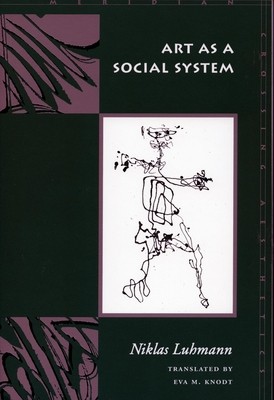
- We will send in 10–14 business days.
- Author: Niklas Luhmann
- Publisher: Stanford University Press
- ISBN-10: 0804739072
- ISBN-13: 9780804739078
- Format: 15.4 x 22.8 x 2.4 cm, minkšti viršeliai
- Language: English
- SAVE -10% with code: EXTRA
Reviews
Description
This is the definitive analysis of art as a social and perceptual system by Germany's leading social theorist of the late twentieth century. It not only represents an important intellectual step in discussions of art--in its rigor and in its having refreshingly set itself the task of creating a set of distinctions for determining what counts as art that could be valid for those creating as well as those receiving art works--but it also represents an important advance in systems theory.
Returning to the eighteenth-century notion of aesthetics as pertaining to the knowledge of the senses, Luhmann begins with the idea that all art, including literature, is rooted in perception. He insists on the radical incommensurability between psychic systems (perception) and social systems (communication). Art is a special kind of communication that uses perceptions instead of language. It operates at the boundary between the social system and consciousness in ways that profoundly irritate communication while remaining strictly internal to the social.
In seven densely argued chapters, Luhmann develops this basic premise in great historical and empirical detail. Framed by the general problem of art's status as a social system, each chapter elaborates, in both its synchronic and diachronic dimensions, a particular aspect of this problem. The consideration of art within the context of a theory of second-order observation leads to a reconceptualization of aesthetic form. The remaining chapters explore the question of the system's code, its function, and its evolution, concluding with an analysis of self-description.
Art as a Social System draws on a vast body of scholarship, combining the results of three decades of research in the social sciences, phenomenology, evolutionary biology, cybernetics, and information theory with an intimate knowledge of art history, literature, aesthetics, and contemporary literary theory. The book also engages virtually every major theorist of art and aesthetics from Baumgarten to Derrida.
EXTRA 10 % discount with code: EXTRA
The promotion ends in 23d.12:00:46
The discount code is valid when purchasing from 10 €. Discounts do not stack.
- Author: Niklas Luhmann
- Publisher: Stanford University Press
- ISBN-10: 0804739072
- ISBN-13: 9780804739078
- Format: 15.4 x 22.8 x 2.4 cm, minkšti viršeliai
- Language: English English
This is the definitive analysis of art as a social and perceptual system by Germany's leading social theorist of the late twentieth century. It not only represents an important intellectual step in discussions of art--in its rigor and in its having refreshingly set itself the task of creating a set of distinctions for determining what counts as art that could be valid for those creating as well as those receiving art works--but it also represents an important advance in systems theory.
Returning to the eighteenth-century notion of aesthetics as pertaining to the knowledge of the senses, Luhmann begins with the idea that all art, including literature, is rooted in perception. He insists on the radical incommensurability between psychic systems (perception) and social systems (communication). Art is a special kind of communication that uses perceptions instead of language. It operates at the boundary between the social system and consciousness in ways that profoundly irritate communication while remaining strictly internal to the social.
In seven densely argued chapters, Luhmann develops this basic premise in great historical and empirical detail. Framed by the general problem of art's status as a social system, each chapter elaborates, in both its synchronic and diachronic dimensions, a particular aspect of this problem. The consideration of art within the context of a theory of second-order observation leads to a reconceptualization of aesthetic form. The remaining chapters explore the question of the system's code, its function, and its evolution, concluding with an analysis of self-description.
Art as a Social System draws on a vast body of scholarship, combining the results of three decades of research in the social sciences, phenomenology, evolutionary biology, cybernetics, and information theory with an intimate knowledge of art history, literature, aesthetics, and contemporary literary theory. The book also engages virtually every major theorist of art and aesthetics from Baumgarten to Derrida.


Reviews